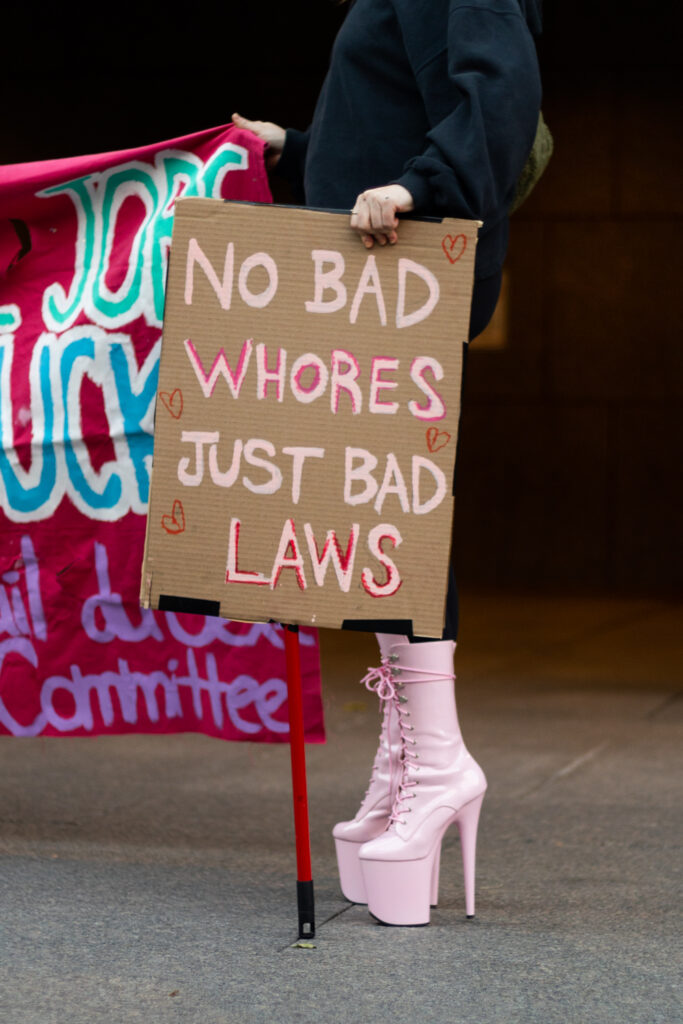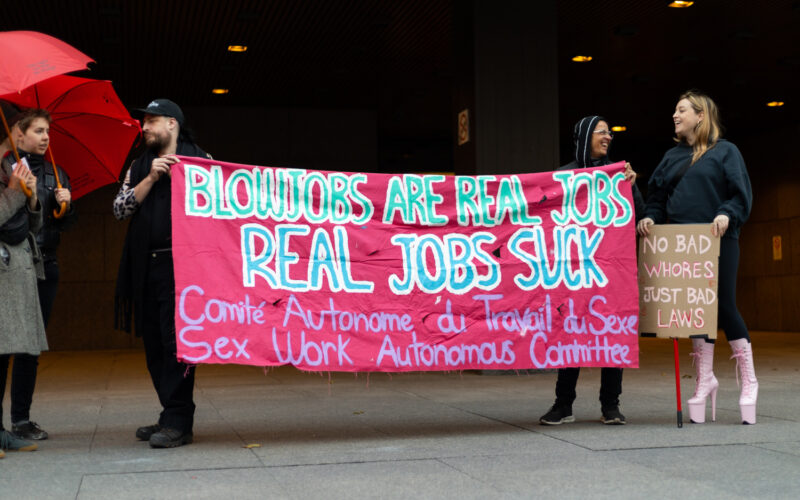The Sex Work Autonomous Committee organized a rally in front of the Montreal courthouse to support their colleagues from the Canadian Alliance for Sex Law Reform
On Friday Oct. 7, the Montreal-based organization Sex Work Autonomous Committee (SWAC) gathered in front of the courthouse for a rally in support of a constitutional challenge to Canadian sex work laws carried out last week by the Canadian Alliance for Sex Work Law Reform (CASWLR) in front of the Ontario Superior Court.
The alliance is made up of 25 different sex workers’ rights groups — three of which are based in Montreal — as well as six individual applicants. These groups are challenging Canada’s sex work-specific criminal laws by arguing they violate sex workers’ constitutional rights to safety, health, autonomy and equality with the ultimate aim of decriminalizing sex work.
The Protection of Communities and Exploited Persons Act (PCEPA) is the current legislative regime around sex work, and was implemented in 2014 under Stephen Harper’s conservative government. The CASWLR is aiming to strike it down because of its harmful consequences on the lives of sex workers.

Melina May, a sex worker activist involved with SWAC, explained that before this act passed, Canada did not have a legal framework specific to sex work. While the laws do not directly criminalize workers, their implementation contributed to an environment that made their work more precarious, dangerous and difficult.
“We are not directly criminalized and that’s how they presented it at first too, like: ‘we’re going to protect sex workers and, by criminalizing clients, we’re going to eradicate the industry,’ but that’s obviously not true,” explained May.
CASWLR national coordinator, Jenn Clamen, explained the introduction of these laws criminalized sex work for the first time officially, putting sex workers in difficult situations.
“What that means is that sex workers are always forced into a context of criminalization,” explained Clamen. “And when you’re forced into working and living in criminalization it means you are separate from more mainstream social projects.”

Both Clamen and May explained the current laws prevent sex workers from organizing and working together, which is often a safety measure they take to avoid agression.
“You’re forced to work in isolation because you’re constantly avoiding detection by law enforcement and police and that isolation comes with a lot of risks,” explained Clamen.
Clamen explained sex workers face many risks when detected by law enforcement, be it losing their livelihood, their housing or their children. For some, it can also mean risking detainment and deportation. Since the law prevents any kind of communication for the purpose of offering sexual services, sex workers have a harder time communicating with their clients which can put them in dangerous situations.
“When you’re prevented from communicating, you’re in a situation where you can’t actually consent to the conditions under which you’re selling sex,” explained Clamen.
The CASWLR hopes the court will first find the PCEPA to be unconstitutional, to then bring their case to the Appeal Court and eventually reach the Supreme Court to fully decriminalize sex work throughout Canada. The Ontario Superior Court will come to a decision in up to six months.
To support their case, the Alliance has submitted over 12,000 pages of evidence to demonstrate that the current legal framework does not fulfill its original purpose of reducing sex work but merely makes it more dangerous.
Clamen explained that this research-based evidence (that also includes testimonies from sex workers) was backed in court by various intervener organizations that have brought forth how some marginalized communities are particularly impacted by sex work laws.
Sandra Wesley, the executive director of Stella, l’amie de Maimie, a Montreal-based organization made up of sex workers, explained that years of organizing has allowed the sex workers’ rights movement to gather the collective knowledge necessary to bring this case forward.
“The reason that there is so many documents is because, despite the prevalent idea that anti-sex work activists need to speak for us […] in reality sex workers are really quite vocal,” said Wesley.
“Sex workers have been involved in research for a long time, we’ve been organized so we’ve been able to build knowledge collectively about everything that has to do with the reality of sex workers.”




